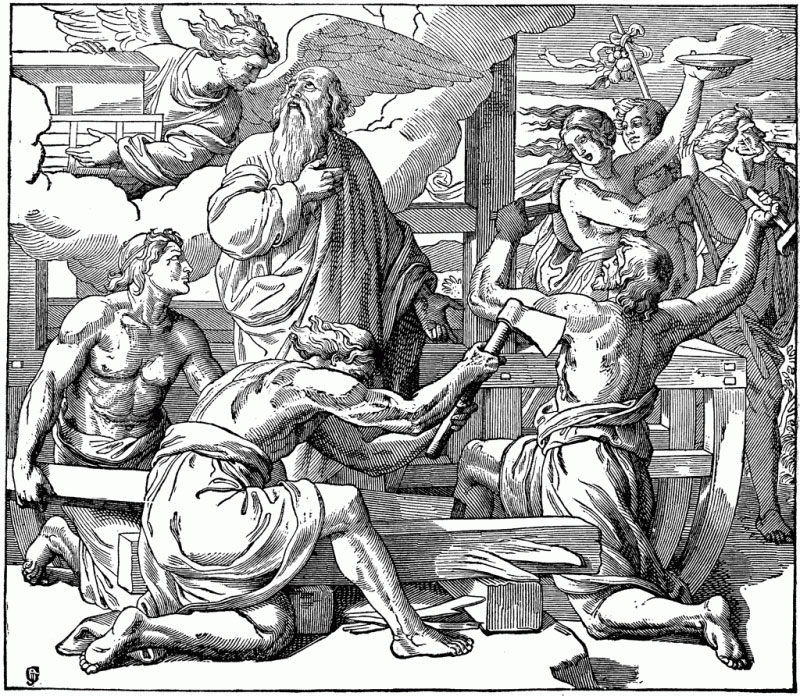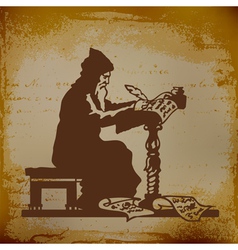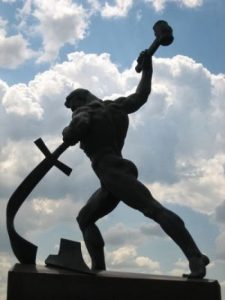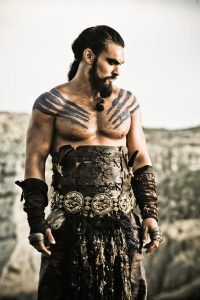Cain’s Aftermath: Cain’s Greatest Sin
This article discusses Cain’s sin of omission and how it impacts the world.
SINS of OMISSION
As Cain’s life now moves into many years, he commits what might be his worst sin—telling no one, including his own family, about God. He leaves them pagan just as he finds them. Cain sets up his own kingdom, but one without godly virtues. His kingdom will continue the inheritance of rebellion.
Why is this omission Cain’s worst sin? Scripture gives an account of why. When Jesus counsels that those who do not believe in God can be forgiven and those who do not believe in him (Jesus) may also be forgiven, but those who interfere with the works of the Holy Spirit will not be forgiven (Mt. 12.32), what does he mean? He means that those who know about God and intentionally interfere with or destroy God’s work cannot be forgiven for such acts. Just as Satan did and just as Cain does, both essentially become committed to a war against God’s works, in Cain’s case, by his conquering hand and, more importantly, that he omits any word concerning God.
I Sam. 15.23, “For rebellion is like the sin of divination, and arrogance like the evil of idolatry” [For rebellion is like the sin of sorcery, stubbornness like the crime of idolatry*].
*The Complete Jewish Study Bible

Unrighteous avenues to benefit or satisfy the Self include rebellion and divination. Crimes against man and the spirit always source the rebellious Self, and divination (sorceries, potions, drugs) replaces seeking after God. Divination short circuits the enlightenment into God, to be replaced with what may seem an answer but does not resemble true revelation, nor may it propose any element of good character. Arrogance (stubbornness) much resembles worshipping the Self. Although Samuel speaks to Saul (left), the above scripture describes Cain quite well.
There remains another matter concerning the sin of omission. Essentially, omission leaves a vacuum in thought. Without attempting to accomplish the goal, even if misdirected, no correction can be made. Thus, making an adjustment, stepping back, and rethinking the situation with wisdom is impossible. All remains undone, and little can be resolved. When a person takes no action, there is no remainder with which God can work.
The above reasons explain why sins of omission can become so impactful. Cain has left the daughters of men without recourse to God’s knowledge, inspiration, or a higher ethic, and it was undoubtedly done with purpose. Vacant, morally and ethically empty as he is, Cain seems content. The attribute of rebellion is similarly deadly to the soul. It can lead to harsh decisions and violent actions. Perhaps more than any other attribute, rebellion compounds upon itself, indulged in any number of ways. Hatred may be case-specific, but rebellion becomes widespread. Concerning Cain, much like the omission of fealty, rebellion becomes easily inherited by the following generation, known today as a generational curse.
Cain may have been banished, but he may also have recanted his murderous nature and asked for forgiveness. He may have done so at any time and changed his ways. Now it is clear, and by willfully interfering in God’s work with others, he has despoiled God’s children, despoiled God’s plan, and continued to murder, and he has committed this great sin of omission—that of telling no one about God. There can be no forgiveness for Cain.
♦
Sons and Daughters
What of the sons of Lamech, of the seventh generation of Cain? This part of scripture establishes the essential components of what will become the modern world: nomadic life, urban life, and industry, the creation of art beyond the making of trinkets, and the making of music beyond drums, and the sword will be wielded.

Both Jabal and Jubal are the children of Ada. “Jabal erected tents, and loved the life of a shepherd,” from Josephus and Gen. 4.20, “He was the father of those who dwell in tents and have livestock.” Jabal is accredited with initiating what is historically known as ‘tent people’ and advances the nomadic culture. Many commentaries attribute Jabal as the person who created the Bedouin culture. Other scholars believe that the Bedouins already existed. Regardless, Jabal’s contribution to nomadic life would not have been after Abraham, who followed God but would have been after the nature of Cain, godless or pagan.
Now into the seventh generation of Cain, and having arrived at Lamech, scripture indicates that Lamech continues to pursue violence and murder. The history of this part of the world now enters into a realm of confusion and serial revenge. Where before a certain ground shared open grazing, conflicts now ensue for land use. As an oasis may have once been free-right, now a tribe claims the oasis as their own. Suspicions may grow as tribes come into contact, tribal grudges erupt, and death often follows. Tribal wars based upon long-ago events become continuous. It is unlikely that forgiveness resides here.
Gen. 9.6 attempts to resolve this issue of inherited tribal and family warfare. “Whoever sheds human blood, by a human being will his own blood be shed.” This law is intended as a judicial prescription to stop revenge killings and the family feuds that almost always follow. As part of the Noahide laws, blood remains sacred, and to God, the taking of human life is anathema. Under Cain’s heritage, men fell under a murderous malediction. Even the sounds of music by Jubal, Jabal’s brother, are pleasant upon one occasion, but upon another, the pounding of drums heightens the warlike fever.
♦
Culture or War?
Serious questions remain concerning Cain’s exclusion of God. A lack of godliness remains at the root of Cain’s civilization. There might be several questions concerning the city Cain built, named Enoch (Eridu). Has the populous become discontent? Is there urban friction? What is the social order? Who maintains the law, and how?
When the ovens operated in the city square of ancient cultic societies, we could see the possible corruption present in Eridu (Dan. 3.13-30, fiery furnace). People guilty of severe crimes found themselves thrown in. Tradesmen and shoppers moved around the city square while the screams shattered the air. A similar godless narrative runs throughout the later attempt to erect Nimrod’s* ziggurat. Cain’s predatory nature remains to move as a spirit unabated across the land. Cain’s civilization provides the template for the world.
*See Noahide Law/Nimrod
“But,” Josephus continues, “Tubul, one of the children by the other wife (Zillah)*, exceeded all men in strength, and was very expert and famous in martial performances. He procured what tended to the pleasures for the body by that method; and first of all, invented the art of making brass.” Tubul continues the tradition of Cain, yet with one important addition. Tubul becomes the first ironmonger. He makes weapons for war and conducts such wars. War is now upon the land, widespread.
*God shuns polygamy. Adam and Eve were the models until the family of Cain broke this tradition in the seventh generation. Under the three sons, many new industries began, but the industry of faithfulness did not prosper. In the seventh generation, all of God’s standards are torn.
As to Lamech himself: “skillful in divine revelation (divination?),” as Josephus writes, “That he knew he was going to be punished for Cain’s murder of his brother… even while Adam was still alive, it came to pass that the posterity of Cain becomes exceedingly wicked, every one successively dying, one after another, more wicked than the former. They were intolerable in war, and vehement in robberies; and if anyone were slow to murder people…and doing injuries for gain,” such a man would be outcast from them.

♦
Seven is the holiest number in Judaism, for it represents perfection, the completed cycle, and points to a final judgment. Josephus writes nothing more concerning Lamech. But we now begin to see a world of war, dictators and kingdoms rising and falling, taxes, strife, theft, and the general pillaging that continues to this day.
Cain’s unwillingness to spread the word of God’s existence leads to calamitous circumstances throughout the land. Of Tubal-Cain, nothing inhibits him; he understands no other behavior but what he sees and thus pursues. He perceives his mission as mighty, perhaps much like the ‘men of renown’ later mentioned in Genesis 6.4—without God, all standards become corrupted. The results of Cain’s sin of omission, Cain’s last and most devastating sin, enter the world at large.

If you have found the Cain series helpful, please comment.
God Bless!


Can I just say what a reduction to seek out someone who truly is aware of what theyre speaking about on the internet. You undoubtedly know how you can carry a difficulty to gentle and make it important. More folks need to read this and understand this facet of the story. I cant believe you’re not more widespread since you undoubtedly have the gift.
Hey very nice blog!! Man .. Beautiful .. Amazing .. I will bookmark your blog and take the feeds also…I am happy to find so many useful information here in the post, we need work out more strategies in this regard, thanks for sharing. . . . . .
I went over this site and I conceive you have a lot of good info, saved to my bookmarks (:.
As a Newbie, I am permanently searching online for articles that can aid me. Thank you
Good day I am so delighted I found your blog page, I really found you by error, while I was searching on Aol for something else, Anyhow I am here now and would just like to say thanks a lot for a marvelous post and a all round thrilling blog (I also love the theme/design), I don’t have time to go through it all at the minute but I have saved it and also included your RSS feeds, so when I have time I will be back to read a great deal more, Please do keep up the fantastic job.
Very interesting details you have observed, appreciate it for putting up. “‘Tis an ill wind that blows no minds.” by Malaclypse the Younger.